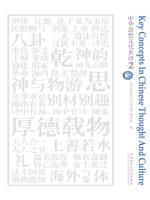Insights Gained from
久酿团子
Key Concepts In Chinese Thought And Culture 2 is a remarkable book that
serves as a profound window into the essence of Chinese traditional
ideology and culture. As I delved into its pages, I was constantly
struck by the depth and wisdom embedded in these age - old concepts. One
of the most fascinating aspects is how it presents concepts that have
shaped the Chinese worldview for millennia. Take “Harmony between Man
and Nature” as an example. This idea isn't just a lofty philosophical
notion; it's a way of life that has guided Chinese people in their
interaction with the environment. In a world today grappling with severe
ecological challenges, this concept offers valuable lessons. It reminds
us that humans are not conquerors of nature but an integral part of it,
and only by living in harmony with nature can we ensure sustainable
development. The book also does an excellent job of unpacking concepts
related to personal cultivation. Concepts like “Virtue Carries All
Things” (厚德载物) emphasize the importance of moral integrity. In a高三
student's life, facing academic pressures and the journey towards
adulthood, these ideas about self - improvement resonate deeply. They
teach us that success isn't merely about achievements but also about
being a person of good character, someone who can “carry all things”
with virtue, be it responsibilities, setbacks, or the pursuit of
knowledge. Moreover, the literary and aesthetic concepts in the book are
a delight to explore. “Thinking While Wandering with Things” (神与物游)
reveals the unique Chinese way of artistic creation and appreciation. It
shows how the Chinese mind connects with the external world, blending
subjective feelings with objective things to produce profound artistic
expressions. For those interested in literature, art, or even just
understanding the Chinese aesthetic sensibility, this concept opens up a
new dimension. It makes us realize that Chinese art isn't just about
form but about the spiritual dialogue between the creator, the work, and
the viewer. However, the book is not without its challenges. Some of the
concepts are deeply rooted in ancient Chinese philosophy and history,
which might make them initially difficult for modern readers, especially
those without a strong background in classical Chinese thought, to fully
grasp. But this also presents an opportunity for readers to engage in
deeper research and reflection, to bridge the gap between ancient wisdom
and modern understanding. In conclusion, Key Concepts In Chinese Thought
And Culture 2 is more than just a book; it's a journey through the
intellectual heritage of China. It enriches our understanding of Chinese
culture, provides timeless wisdom for personal growth, and offers
solutions to some of the global challenges we face today.



 京公网安备 11010802032529号
京公网安备 11010802032529号